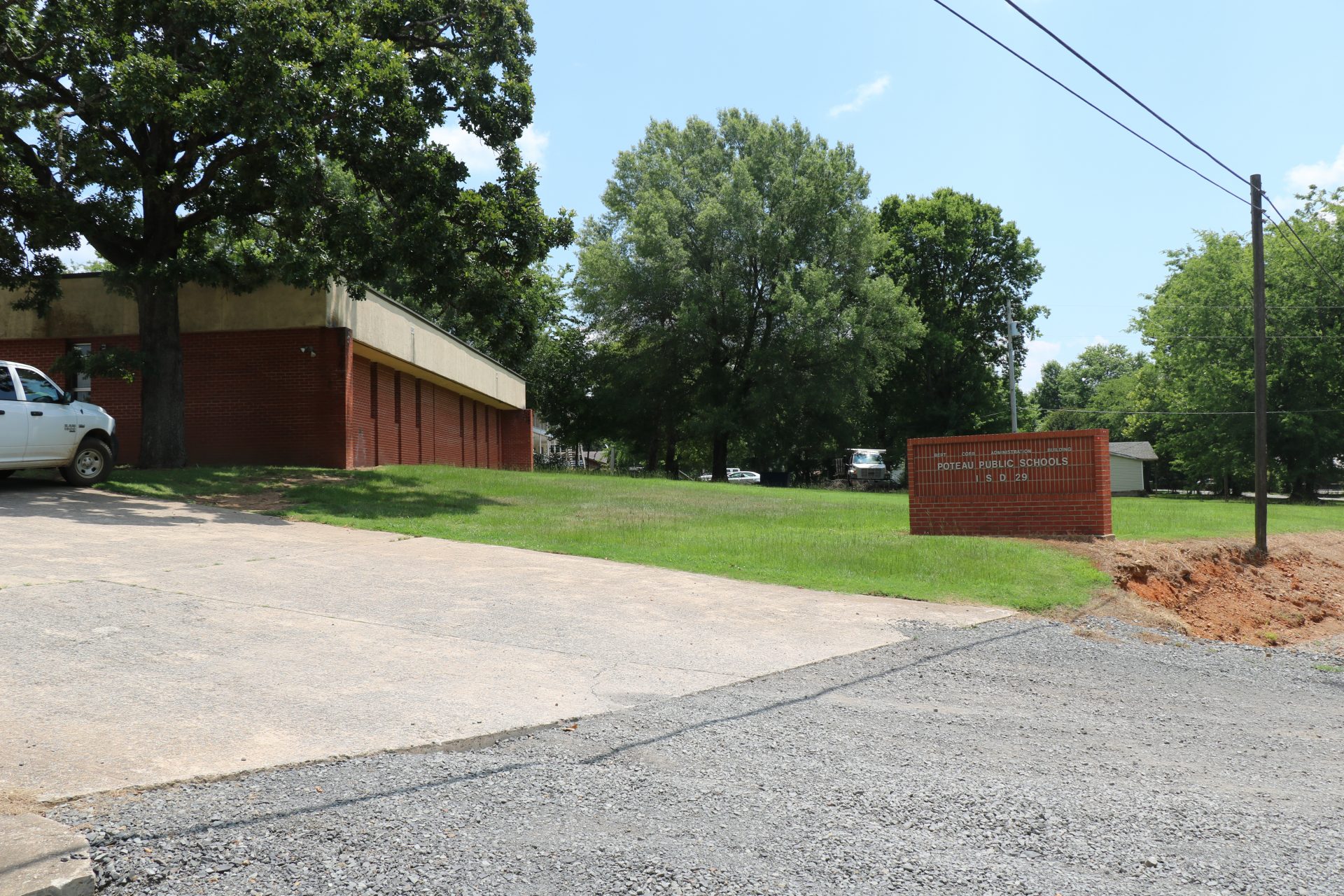
Poteau Public Schools office in Poteau, Oklahoma. The Eastern Oklahoma district received more than $800,000 to hire mental health workers for its schools.
Robby Korth / StateImpact Oklahoma


Poteau Public Schools office in Poteau, Oklahoma. The Eastern Oklahoma district received more than $800,000 to hire mental health workers for its schools.
Robby Korth / StateImpact Oklahoma

Robby Korth / StateImpact Oklahoma
A sign outside Poteau High School in Poteau, Oklahoma. Poteau Public Schools is beefing up its social-emotional offerings via Oklahoma’s $35 million Counselor Corps.
Brenda Dalton knows the ideal way to get kids in Poteau back into the swing of things for learning is to give them mental health support.
“We feel like the best thing for our students is for someone to be here on staff who knows our teachers and knows our kids, every day,” she said.
That’s why the Poteau Public Schools Student Services Director made a big bet on asking for help via Oklahoma’s Counselor Corps, a $35 million program to hire hundreds of counselors in schools across the state.
She asked the state to partially fund two school counselors, two mental health providers, two districtwide social workers and contract services for mental health as needed. Poteau Public Schools got the money for each position.
In total, the $810,000 Poteau received will last three years.
“We identified these needs a long time ago,” Dalton said. “We just didn’t have the money to provide for them.”
The American School Counselor Association recommends a student-to-counselor ratio of 250-to-1. Oklahoma’s statewide average is currently at 411-to-1. Poteau’s is better than the statewide average at most sites, but still nowhere near where it should be.
“Our goal would be to stay under that 250 or right around that 250,” Dalton said.
The counselor corps will be made up of 222 school counselors and almost 100 other student well-being workers statewide. The goal: Improve wellness for students around the state. State schools superintendent Joy Hofmeister told educators during a virtual conference last month that the program will lay the foundation for full learning recovery after the pandemic.
“If we are to encourage our students to be on track for academic success, we must first take steps and action to wrap supports around the whole child,” she said.
Like many districts, Poteau is pursuing a tiered approach to mental health services. Misty Haney is a special education teacher in the district and she’s been looking forward to beefing up those wraparound supports.
“Been looking forward to this for a long time,” she said.
Poteau hired a couple of part-time counselors in January of this year. And she says they’ve already helped students grow at the elementary level. But more counselors at more sites will make things better across the district.
“I’m seeing success,” she said. “I’m seeing growth in our children. And I think our teachers will see that and feel a little bit of relief.”
The challenge, though, will be filling the positions. There’s a distinct shortage of mental health workers in the state – especially in eastern Oklahoma. So far Poteau has only filled one of their six jobs. Brittany Hayes is policy director for the non-profit Healthy Minds Policy Initiative. She says there are plenty of mental health workers in the state, but they’re working with adults.
“But I think that as we see the children’s mental health crisis sort of escalate, a lot of people are going to be moving toward that system,” Hayes said.
Oklahoma has over 800 individuals who are certified to be a mental health professional in school, something like a school psychologist, who are not practicing. That includes about 500 classroom teachers. But, there are administrative requirements and red tape that could hold teachers back from getting the proper license to be a counselor in a school.
“Too often those who aren’t serving in that role aren’t serving because the school doesn’t fund that role,” Hayes said.

Robby Korth / StateImpact Oklahoma
A yearbook and Chamber of Commerce plaque inside Poteau Public Schools’ administration building.
The three year window on the grant means the positions will be difficult to fund permanently, Dalton said.
But that doesn’t mean at the end Poteau will lose all of its support for students, Dalton said.
The ultimate goal is to demonstrate value and ensure that Poteau’s students continue to get what they need.
“Once when people start seeing progress, they get excited about things and you get real creative on how to keep those things going if you know they’re working. So… hopefully we’ll be able to see that kind of progress,” she said.